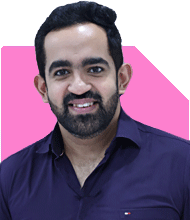Ramalingam Kalirajan |8093 Answers |Ask -Follow
Mutual Funds, Financial Planning Expert - Answered on Jun 25, 2024
He has an MBA in finance from the University of Madras and is a certified financial planner.
He is the director and chief financial planner at Holistic Investment, a Chennai-based firm that offers financial planning and wealth management advice.... more

Hello sir, I’m a house wife in my 40’s. Now that my daughter is getting settled with her college, I would like get to try my hands on stock or mutual funds or anything that suits me best, but I’m complete layman in this. Kindly advise how do I go about it.
Understanding Your Financial Situation
You're in your 40s and have some time to build and grow your investments. Starting now can give you the benefit of compounding over the years.
Setting Financial Goals
Before we jump into investments, it's important to set clear financial goals. Here are some common goals you might consider:
Retirement Planning: Ensuring you have a comfortable and secure retirement.
Emergency Fund: Setting aside funds for unexpected expenses.
Wealth Creation: Growing your wealth for future needs or desires.
Basics of Stocks and Mutual Funds
Stocks
Stocks represent ownership in a company. When you buy stocks, you become a part-owner of that company.
Advantages:
High Returns: Stocks can offer higher returns compared to other investments over the long term.
Dividend Income: Some companies pay dividends, providing regular income.
Risks:
Market Volatility: Stock prices can fluctuate significantly in the short term.
Company Performance: Your investment is tied to the company's performance.
Mutual Funds
Mutual funds pool money from multiple investors to invest in a diversified portfolio of stocks, bonds, or other securities.
Advantages:
Diversification: Reduces risk by spreading investments across various assets.
Professional Management: Managed by experienced fund managers.
Risks:
Management Fees: Actively managed funds charge fees which can impact returns.
Market Risk: Mutual funds are subject to market risks, though diversified.
Getting Started with Mutual Funds
Given your newness to investing, mutual funds might be a more suitable starting point. They offer diversification and professional management, which can be beneficial if you're not familiar with individual stock picking.
Types of Mutual Funds
Equity Mutual Funds: Invest primarily in stocks. Suitable for long-term goals.
Debt Mutual Funds: Invest in bonds and other fixed-income securities. Suitable for stability and regular income.
Hybrid Funds: Combine equity and debt investments for balanced risk and return.
Actively Managed Funds vs. Index Funds
You might hear about index funds, which track a specific market index. While they have lower fees, they simply mirror the market's performance. Actively managed funds, on the other hand, aim to outperform the market through strategic investments.
Disadvantages of Index Funds:
Limited Performance: They can't outperform the market.
Market Dependency: They are entirely dependent on the market's performance.
Benefits of Actively Managed Funds:
Professional Expertise: Fund managers actively make decisions to beat the market.
Adaptability: These funds can adjust to market conditions.
Benefits of Regular Funds Through an MFD with CFP Credential
Investing through a Mutual Fund Distributor (MFD) who is also a Certified Financial Planner (CFP) provides several advantages:
Personalized Advice: Tailored investment strategies based on your goals and risk tolerance.
Professional Management: Regular funds managed by professionals adapt better to market changes.
Continuous Monitoring: Ongoing support and portfolio adjustments ensure alignment with your goals.
How to Start Investing in Mutual Funds
Step 1: Define Your Investment Goals
Identify what you want to achieve with your investments. It could be retirement, building an emergency fund, or wealth creation.
Step 2: Assess Your Risk Tolerance
Understand how much risk you're comfortable taking. This will help determine the type of funds suitable for you.
Step 3: Choose the Right Funds
Based on your goals and risk tolerance, select a mix of equity, debt, and hybrid funds. Diversification helps manage risk.
Step 4: Start Small
Begin with a manageable amount. As you become more comfortable, you can increase your investment.
Step 5: Regular Investments
Set up a Systematic Investment Plan (SIP) to invest a fixed amount regularly. This helps in disciplined investing and takes advantage of market fluctuations.
Tax-Saving Investments Under Section 80C
Mutual funds also offer tax-saving options. Equity Linked Savings Scheme (ELSS) funds provide tax benefits under Section 80C.
Advantages of ELSS:
Tax Benefits: Investments up to Rs 1.5 lakhs are eligible for tax deductions.
Short Lock-in Period: ELSS funds have a 3-year lock-in period, the shortest among tax-saving options.
Potential for High Returns: Being equity-based, they offer higher returns over the long term.
Retirement Planning
Given your current age, you have ample time to build a substantial retirement corpus. Here's how you can plan:
Consistent SIPs: Invest regularly in a mix of equity and debt funds.
Increase Contributions: As your understanding and comfort with investments grow, increase your SIP amounts.
Review and Rebalance: Regularly review your portfolio and make necessary adjustments to stay aligned with your goals.
Genuine Compliments
It's wonderful that you're taking the initiative to learn about investing. Your proactive approach is commendable and will surely pay off in the long run.
Empathy and Understanding
I understand that starting something new can be daunting, especially with financial investments. But your willingness to learn and grow is a great step forward.
Final Insights
Starting with mutual funds is a prudent choice given your novice status in investing. Diversifying your portfolio across equity, debt, and hybrid funds can help manage risk while aiming for growth. Actively managed funds, with the expertise of professional fund managers, can potentially offer better returns than index funds.
Consulting with a Certified Financial Planner (CFP) ensures you receive personalized and professional advice. Regularly investing through SIPs, setting clear financial goals, and reviewing your portfolio periodically are key steps to achieving your financial aspirations.
Your proactive approach and willingness to learn about investments will undoubtedly help you build a secure and prosperous financial future.
Best Regards,
K. Ramalingam, MBA, CFP,
Chief Financial Planner,
www.holisticinvestment.in
You may like to see similar questions and answers below
Samraat Jadhav |2223 Answers |Ask -Follow
Stock Market Expert - Answered on Mar 24, 2024
Ramalingam Kalirajan |8093 Answers |Ask -Follow
Mutual Funds, Financial Planning Expert - Answered on May 01, 2024
Ramalingam Kalirajan |8093 Answers |Ask -Follow
Mutual Funds, Financial Planning Expert - Answered on May 06, 2024
Ramalingam Kalirajan |8093 Answers |Ask -Follow
Mutual Funds, Financial Planning Expert - Answered on Jul 27, 2024
Milind Vadjikar |1102 Answers |Ask -Follow
Insurance, Stocks, MF, PF Expert - Answered on Mar 12, 2025
Dr Dipankar Dutta |956 Answers |Ask -Follow
Tech Careers and Skill Development Expert - Answered on Mar 12, 2025
Radheshyam Zanwar |1412 Answers |Ask -Follow
MHT-CET, IIT-JEE, NEET-UG Expert - Answered on Mar 12, 2025
Radheshyam Zanwar |1412 Answers |Ask -Follow
MHT-CET, IIT-JEE, NEET-UG Expert - Answered on Mar 12, 2025
Inderpaul Singh |47 Answers |Ask -Follow
Leadership Coach - Answered on Mar 12, 2025
T S Khurana |398 Answers |Ask -Follow
Tax Expert - Answered on Mar 12, 2025
T S Khurana |398 Answers |Ask -Follow
Tax Expert - Answered on Mar 12, 2025
Rajesh Kumar Singh |192 Answers |Ask -Follow
IIT-JEE, GATE Expert - Answered on Mar 12, 2025
T S Khurana |398 Answers |Ask -Follow
Tax Expert - Answered on Mar 12, 2025
Aamish Dhingra |14 Answers |Ask -Follow
Life Coach - Answered on Mar 12, 2025




























